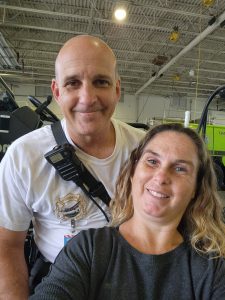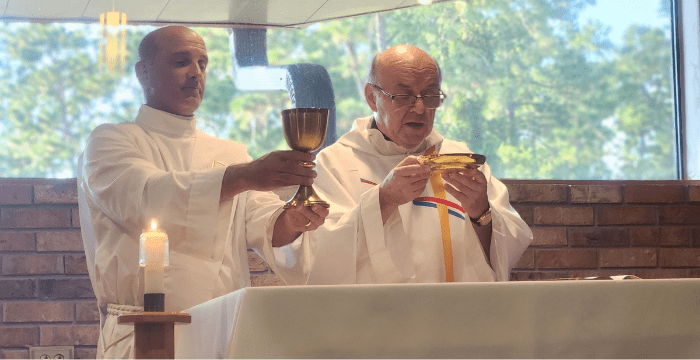Interested in the Order of Deacons? Join us for our Discernment Nights by clicking here.
ORLANDO | Many Catholic deacons have this common experience: As they greet people after Sunday Mass, a congregant might smile and wave as they call out, “Thank you, Father.”
A new deacon might try to correct them saying, “I’m a deacon, not a priest.” But after hearing that greeting hundreds of times, more seasoned deacons might sometimes simply smile and wave back. “I do have children,” the deacon might think, “so I guess I’m a father, too.”
One time, a longtime parishioner remarked how I “preached really well for a lay person.” I thanked him for the compliment, but he had a look of surprise when I added I wasn’t a lay person but a clergyman, as well. It underscored the ongoing misunderstanding of who a deacon is.
As we approach another discernment period for men who discern a vocational call to the permanent diaconate, it seems an opportune time to clear up some of the mystery of the Order of Deacons, a cleric who leads a lay life.
DEACONS ARE CLERGY
Deacons are clergy. Holy Orders in the Catholic Church are the sacrament by which men are ordained as bishop, priest or deacon. Each are ordained for a distinct ministry. Bishops are the direct successors of the apostles and ordained to be the shepherds of their local church. Priests assist the bishops in performing their pastoral ministry, and are entrusted with the celebration of the Eucharist, the administration of the sacraments, and spreading the Gospel. Deacons are ordained to the ministry of service, dedicated to the ministry of charity, and to assisting at the Eucharistic celebration, preaching and teaching, administering the Sacraments of Baptism and Marriage, and presiding at funeral services. Each of the three degrees of Holy Orders conveys a unique sacramental grace upon the ordained. Deacons are specifically configured in the person of Christ the Servant.
Although they are clergy, deacons do not always wear the distinctive clerical shirt with Roman collar as many bishops and priests are seen wearing. While Canon Law does allow for that possibility, the decision for deacons to wear clerics or lay attire is left to the local bishop. About half of the dioceses in the United States allow for deacons to wear clerics, while others, like the Diocese of Orlando, do not. Wearing or not wearing clerics does not change the nature of a deacon’s ministry. Since most deacons work in secular employment and not for the Church, it may be more appropriate for us to wear clothing like those with whom we live and work.

MARRIAGE AND EMPLOYMENT
While deacons are clergy, there are circumstances of their lives that are different from bishops and priests. Many people are confused how deacons are clergy who can be married, while bishops and priests cannot. While the Church might ordain a man who is already married, once ordained a deacon cannot get married. If he, the candidate, is single at the time of ordination he accepts the vow of celibacy. If a married deacon loses his wife, he may not remarry but is called to continue his life and ministry in a celibate state.
Another common misunderstanding about deacons is, while ordained ministers, the Church does not take responsibility for their financial security. Deacons are expected to provide for themselves and their families during their working years and in retirement. Deacons are everything from firefighters to businessmen, doctors and accountants. If a deacon is employed by a Church, it is not simply because he is a deacon, but rather that he has the necessary skills and experience to serve the Church in the role for which he has been hired. Most of the duties performed by the deacons in your parish are done for free as part of the vocational responsibility they have accepted through ordination. As a bishop once said, “Deacons are the best deal in the Church.”
VOCATIONAL CALL
The vocational call to the permanent diaconate is a call from God, not something that a man chooses to do. That call may come at any time in a man’s life. Becoming a deacon is not a retirement job for a faithful Catholic man who wishes to serve his Church and now has the time to do so. Men who hear this calling and have the support of their pastor and community may apply for consideration to enter the six-year formation program as young as 29, and as old as 59. (The diocese does not ordain men before 35 or after 65.) Discernment of his vocation is ongoing during these six years with the man, his family, and the Church seeking to affirm where God is calling him.
And if that vocational call is affirmed, then the man receives the Sacrament of Holy Orders becoming a cleric in the Catholic Church, uniquely configured to the person of Christ the Servant.
If you are a man who believes you may have a vocational call to the permanent diaconate or know someone who is trying to discern this potential vocation, then consider attending one of the upcoming Discernment Nights offered in September at parishes throughout the Diocese. Let us help you discern if God may be calling you to the unique clerical vocation which straddles the line between the sacred and the secular.
By Deacon Dave Camous, Special to the Florida Catholic, August 21, 2025

